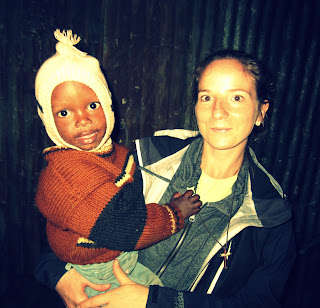November 27, 2012 (Sam)
Nancy’s frail body shook gently and an occasional whimper broke the uncomfortable silence in the classroom as we sat together and she described what her life has been like for the last year.
As a part of our work here, helping to institute a child sponsorship program at Beacon of Hope, Christina and I have been sitting down with a lot of parents recently and talking to them about their children, assessing their families’ vulnerabilities and determining their most pressing needs. Half of the time, the parents are crying as we talk to them... the other half of the time, I’m usually crying.
And so I sat there, my hand awkwardly resting on Nancy's shoulder, trying to comfort her as she gasped for breath in between run-on sentences in which she attempted to explain her family’s struggles.
Nancy and her husband were happily married with three children. Nancy's husband is a construction worker, and the one who supplies for the family’s financial needs. Nancy does casual labor here and there, but nothing steady. Around a year ago, Nancy found out that her husband had another family. He was married to another woman who lived in another city; for how long she did not know. Upon realizing that he’d been found out, Nancy's husband simply left her and the children, taking with him all of their earthly possessions. Nancy suddenly found herself alone, with nothing but three children, and no way to provide for them. She sought out refuge at her parent’s house, but upon learning that her husband had left their family, Nancy and her children were turned away, her family too ashamed by her pathetic situation to show them any pity. When her brother found out what had happened, he came to visit Nancy. He proceeded to beat her savagely, rebuked her for her failure to please her husband, and left. She has been rejected by everyone she knows. Nancy now suffers from what Christina and I have come to call the “Big Three:" lack of food, rent, and school fees. These are the three most common needs that we seem to encounter here.
We may all be able to relate to the importance of food; after all, we need it to live. The same goes for shelter; without a roof over our heads, well, we’re in just about as bad of a position. But education? Really? I mean, I know that going to school is important and all, but does it really rank up there with food and shelter? Well, from what Christina and I have come to learn, the importance of education here is totally different than we might perceive it to be back in the US. Going to school in Kenya is about more than just setting yourself up for success in the corporate world. It’s not just about the difference between a well-paying job and a dead-end one. Being in school here literally means the difference between life and death for some kids. The fact is, especially in slum areas, when children aren’t in school, they find other hobbies to occupy their days. Idle time is the biggest contributor to teenage pregnancies, violent crime, and drug addictions. Many children who aren’t in school end up being young mothers, criminals, or cadavers. People here know this, and this fact is one of the biggest reasons that parents often make the tough decision to forego food for themselves rather than allow their child to get sent home from school. This is just one of the reasons that educational support initiatives and child sponsorship are so important in Kenya.
So after she finished telling me her despairing story, Nancy just sat there: her head in her hands, a tissue occasionally dabbing at her eyes and nose. And all I could do was lean over, put my hand on her shoulder, and tell her that we would be praying for her, and that we’d do everything we could to find sponsors for her children. I wish I could have said more.
Then from across the room I heard another wail pierce the air. I looked up to see a woman, clutching her 6 year old daughter by her side, staggering across the room, holding a piece of paper in front of her face so people couldn’t see the tears streaming down her cheeks. She heaved heavily a few more times before she made it out the door. I went over and asked Christina what had happened to make her so upset. “She wasn’t upset.” Christina replied, a slight smile playing at her lips, “We just got to tell her that we found a sponsor for her daughter.” My breath caught in my throat and tears welled in my eyes. Another child now has a more hopeful future to look forward to.














